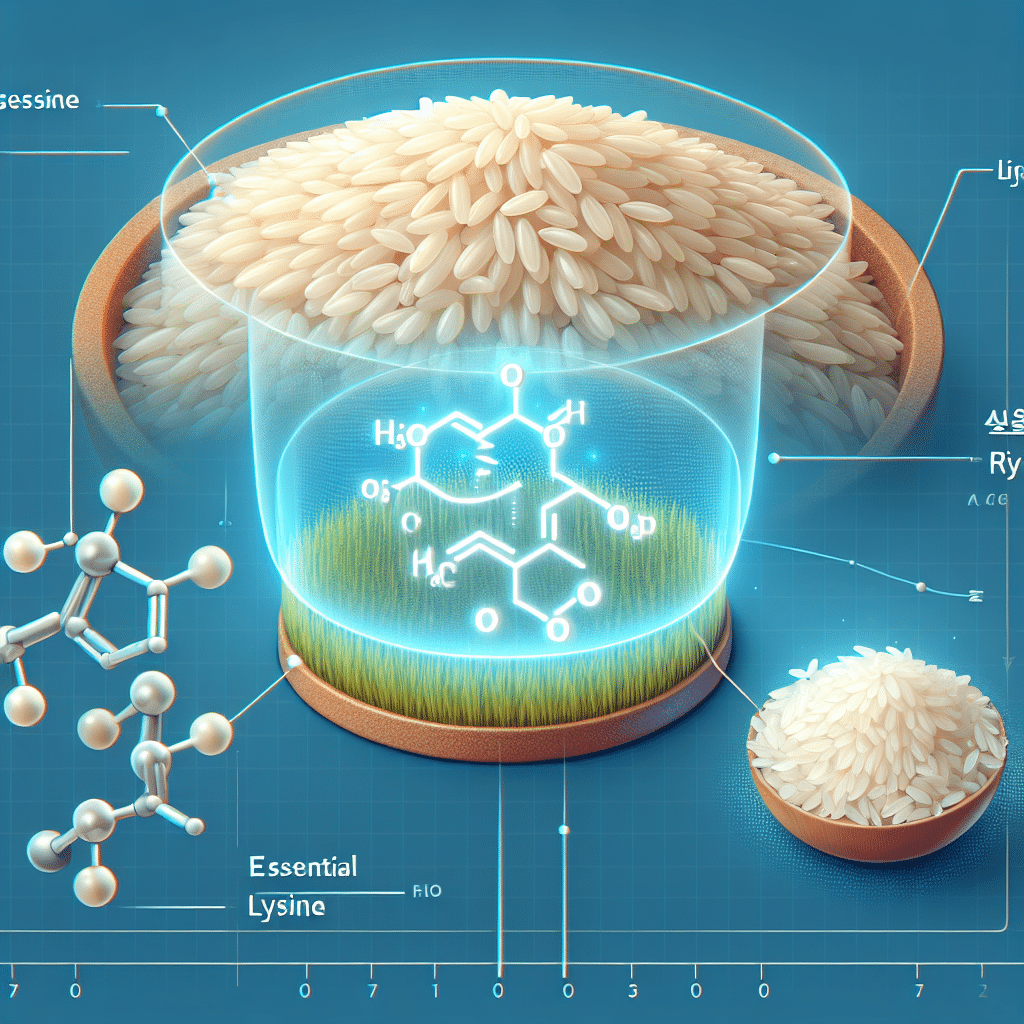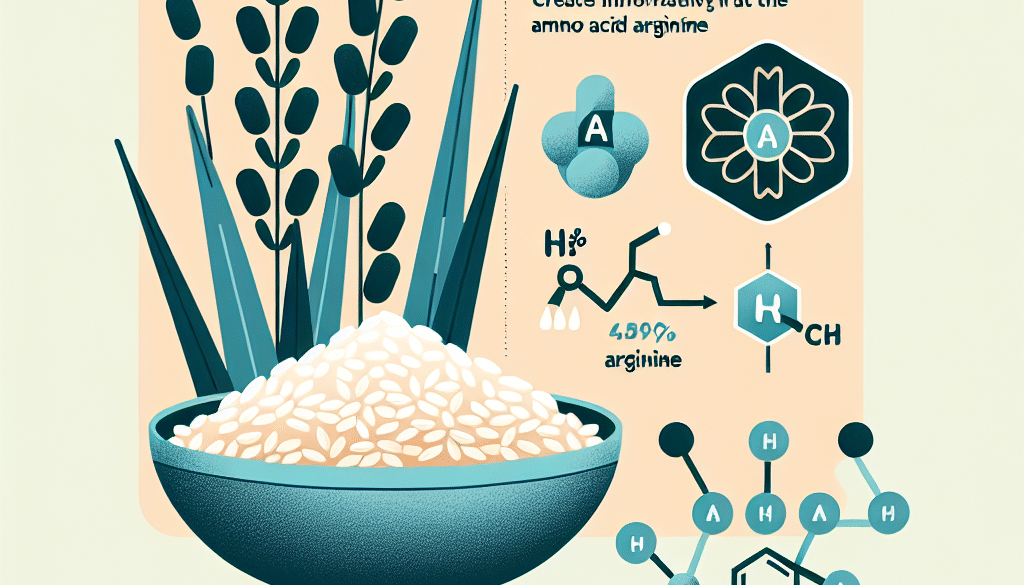Which Amino Acid Is Rice Rich In?
-
Table of Contents
- Rice Protein Profile: Discovering the Rich Amino Acid Content
- Understanding Amino Acids in Rice
- The Amino Acid Rice Is Rich In
- Nutritional Benefits of Rice Protein
- Comparative Analysis of Rice Protein with Other Plant Proteins
- Case Studies and Statistics
- Conclusion: The Significance of Rice Protein in Nutrition
- Explore ETprotein’s Premium Protein Products
Rice Protein Profile: Discovering the Rich Amino Acid Content

Rice, a staple food for over half of the world’s population, is not only a significant source of energy but also contains a variety of nutrients, including amino acids. Amino acids are the building blocks of proteins, which are essential for numerous bodily functions. In this article, we will delve into the amino acid profile of rice, focusing on which amino acid it is particularly rich in, and how this contributes to its nutritional value.
Understanding Amino Acids in Rice
Amino acids are organic compounds that combine to form proteins. They are classified into essential and non-essential amino acids. Essential amino acids cannot be synthesized by the body and must be obtained from the diet, while non-essential amino acids can be produced by the body.
Rice protein is considered to be of high quality, containing all nine essential amino acids. However, it is often regarded as a lower-quality protein compared to animal proteins because it has lower levels of some essential amino acids, particularly lysine. Despite this, rice is still a valuable protein source, especially for those following a plant-based diet.
The Amino Acid Rice Is Rich In
While rice may have lower levels of lysine, it is particularly rich in the amino acid methionine. Methionine is an essential amino acid that plays a critical role in metabolism and detoxification. It is also a precursor to cysteine, another amino acid that is vital for synthesizing glutathione, an antioxidant that protects cells from damage.
Here are some key functions of methionine:
- Acts as a methyl donor in various biochemical processes.
- Involved in the synthesis of other amino acids.
- Essential for the production of S-adenosylmethionine (SAMe), which is involved in the methylation of DNA.
- Helps in the breakdown of fats, preventing the build-up of fat in the liver and arteries.
Given its importance, rice’s richness in methionine makes it an excellent addition to a balanced diet, particularly for vegetarians and vegans who might not get enough of this amino acid from plant-based sources.
Nutritional Benefits of Rice Protein
Rice protein offers several health benefits, making it a popular choice for dietary supplements and plant-based protein powders. Here are some of the advantages:
- Hypoallergenic: Rice protein is a great alternative for people with allergies to soy, dairy, or gluten.
- Easy Digestion: It is easily digestible, making it suitable for individuals with sensitive stomachs.
- Weight Management: High-protein diets have been linked to weight loss and rice protein can be a part of such a diet.
- Muscle Growth: Like other proteins, rice protein supports muscle growth and repair, especially after exercise.
- Heart Health: Rice protein may contribute to heart health by helping to lower cholesterol levels.
Comparative Analysis of Rice Protein with Other Plant Proteins
When compared to other plant-based proteins, such as those from peas or soy, rice protein has a unique amino acid profile. Each plant protein has its strengths and weaknesses in terms of amino acid composition. For instance, pea protein is richer in lysine but lower in methionine and cysteine. Soy protein is considered a complete protein but may not be suitable for everyone due to potential allergens and phytoestrogen content.
Therefore, combining rice protein with other plant proteins can create a more balanced amino acid profile, enhancing the overall nutritional value of a plant-based diet.
Case Studies and Statistics
Several studies have highlighted the benefits of rice protein. For example, a study published in the journal “Nutrition & Metabolism” found that rice protein isolate consumption post-resistance exercise improved body composition and exercise performance similarly to whey protein isolate in male athletes.
Statistics show that the demand for rice protein is on the rise, with the global rice protein market expected to grow significantly. This growth is driven by the increasing popularity of plant-based diets and the demand for hypoallergenic protein sources.
Conclusion: The Significance of Rice Protein in Nutrition
In conclusion, rice is rich in the essential amino acid methionine, which plays a crucial role in various bodily functions. Despite being lower in some essential amino acids like lysine, rice protein is a valuable component of a balanced diet, especially for those following plant-based diets. Its hypoallergenic nature, ease of digestion, and potential health benefits make it an excellent choice for individuals looking to increase their protein intake through plant-based sources.
For those interested in incorporating high-quality rice protein into their diet, ETprotein offers a range of organic rice protein products that are non-GMO and allergen-free. Their products are ideal for various industries, including nutraceuticals, pharmaceuticals, and food and beverage.
Explore ETprotein’s Premium Protein Products
If you’re looking for top-notch rice protein and other plant-based protein options, ETprotein is your go-to source. Their extensive selection of proteins, including organic rice protein, is characterized by a neutral taste and high purity levels, catering to a wide array of applications. Whether you’re a manufacturer, trader, or distributor, ETprotein can meet your protein needs with their quality products and services.
About ETprotein:
ETprotein, a reputable protein and L-(+)-Ergothioneine (EGT) Chinese factory manufacturer and supplier, is renowned for producing, stocking, exporting, and delivering the highest quality organic bulk vegan proteins and L-(+)-Ergothioneine. They include Organic rice protein, clear rice protein, pea protein, clear pea protein, watermelon seed protein, pumpkin seed protein, sunflower seed protein, mung bean protein, peanut protein, and L-(+)-Ergothioneine EGT Pharmaceutical grade, L-(+)-Ergothioneine EGT food grade, L-(+)-Ergothioneine EGT cosmetic grade, L-(+)-Ergothioneine EGT reference grade and L-(+)-Ergothioneine EGT standard. Their offerings, characterized by a neutral taste, non-GMO, allergen-free attributes, with L-(+)-Ergothioneine purity over 98%, 99%, cater to a diverse range of industries. They serve nutraceutical, pharmaceutical, cosmeceutical, veterinary, as well as food and beverage finished product distributors, traders, and manufacturers across Europe, USA, Canada, Australia, Thailand, Japan, Korea, Brazil, and Chile, among others.
ETprotein specialization includes exporting and delivering tailor-made protein powder and finished nutritional supplements. Their extensive product range covers sectors like Food and Beverage, Sports Nutrition, Weight Management, Dietary Supplements, Health and Wellness Products, and Infant Formula, ensuring comprehensive solutions to meet all your protein needs.
As a trusted company by leading global food and beverage brands and Fortune 500 companies, ETprotein reinforces China’s reputation in the global arena. For more information or to sample their products, please contact them and email sales(at)ETprotein.com today.














